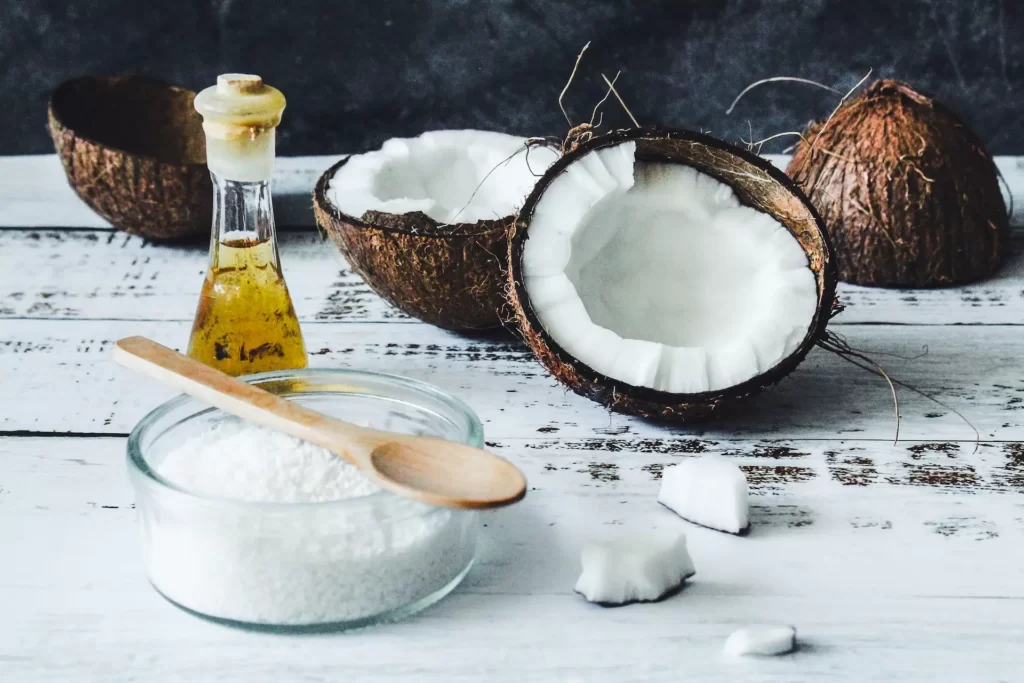Coconut Oil — What is it?
Coconut oil is a vegetable oil obtained from the flesh of the coconut palm fruit (Cocos nucifera). It has a rich coconut aroma and is widely used in the food, cosmetic, and medical industries. It is one of the most popular oils worldwide due to its numerous benefits and versatile applications.
The process of obtaining oil begins with collecting fresh coconuts and extracting their flesh. The flesh is ground and undergoes an extraction process, which can be either cold-pressed or hot-pressed. Cold-pressing involves extracting oil from fresh coconut meat without using high temperatures. This method helps preserve its beneficial properties. Hot-pressing involves heating the flesh to extract oil but may lead to the loss of some nutrients.
Coconut oil is rich in saturated fatty acids, primarily lauric acid, which makes up about 50% of its total content. Lauric acid possesses antimicrobial properties that can help combat various bacteria, viruses, and fungi. It can also contribute to increasing the levels of good cholesterol in the body.
Additionally, oil contains vitamins E and K, iron, and antioxidants that help fight free radicals and reduce inflammation. These properties make it a valuable component in cosmetic and skincare products. It is used for moisturizing skin and hair, alleviating dryness and irritation, and as a base for making soaps, shampoos, creams, and other cosmetic products.
Coconut oil also has a wide range of uses in the food industry. It can be used for cooking, frying, baking, and added to various dishes. Due to its stability when heated and high melting point, this oil is an excellent alternative to other vegetable oils.
Health Benefits
Coconut oil is also known for its potential health benefits. Lauric acid present in it can aid in maintaining a healthy metabolism, boosting immunity, and improving digestion. Some studies also suggest that it may help lower harmful cholesterol levels in the body.
However, it’s important to note that oil is a high-calorie product due to its saturated fat content. Moderate consumption is recommended to maintain a healthy dietary balance.
It’s worth noting that this oil comes in various forms, such as refined and unrefined. Refined oil undergoes a process of purification and deodorization, resulting in a more neutral taste and aroma. Unrefined coconut oil retains the natural coconut scent and taste but may have a lower degree of purification.
For Frying: A Healthy and Delicious Alternative

Coconut oil serves as an excellent alternative for frying food and a healthy replacement for traditional vegetable oils. Its high melting temperature and stability when heated make it an ideal choice for preparing various dishes.
One of the main advantages of using oil for frying is its composition. It is rich in saturated fatty acids, particularly lauric acid. This acid possesses antimicrobial properties and can help bolster the immune system. Moreover, coconut oil contains fewer trans fats and polyunsaturates compared to some other oils, making it a healthier choice for frying.
Coconut oil also adds a pleasant aroma and taste to prepared dishes. It imparts a light coconut note to the food, which can blend perfectly with various ingredients, providing them with a distinctive flavor.
When using oil for frying, it is important to regulate the temperature correctly. It has a high smoke point, which means it can withstand high heat without breaking down or forming harmful substances. This helps retain the juiciness inside the food while achieving a crispy outside.
Considering the concentrated saturated fat content of coconut oil when used for frying, moderation is recommended to maintain a balanced diet.
Coconut Oil in Cosmetics: A Natural Beauty & Care Product

Coconut oil stands as one of the most popular and versatile ingredients in the cosmetic industry. Its natural properties and rich composition make it an ideal choice for skincare, hair care, and nail care.
As a moisturizer, oil helps restore the skin’s natural moisture. It absorbs quickly, leaving the skin soft, smooth, and hydrated. It also possesses antioxidant properties that help protect the skin from free radicals and premature aging.
Moreover, coconut oil can be used as a natural makeup remover. It efficiently removes waterproof cosmetics without drying out the skin.
For hair care, it can be used as a conditioner and as a means to strengthen and soften the hair. It penetrates the hair structure, nourishing and moisturizing it, leading to healthier and shinier hair. This oil can also help reduce hair breakage and diminish split ends.
When it comes to nails, oil can be used to strengthen and improve their condition. Regular application of oil on the nail plate helps moisturize and fortify the nails, preventing brittleness and chipping.
As mentioned earlier, this product is available in various forms, including refined and unrefined. Unrefined coconut oil retains a more complete set of nutrients, whereas refined oil may have a more neutral smell and taste.
In cosmetics, it is a valuable natural product for beauty and care. Its moisturizing, nourishing, and protective properties make it an ideal component for various cosmetic products such as creams, lotions, masks, balms, and more.
How to Choose the Best Coconut Oil?

Coconut oil is a popular product available in various forms in the market. To select the best oil, several key factors should be considered.
First, it is preferable to choose unrefined coconut oil. Unrefined oil undergoes minimal processing and retains more nutrients and the coconut aroma. It usually has a natural white color and a pleasant aroma, which are signs of a quality product.
Second, pay attention to the oil’s origin. It’s preferable to choose oil produced from organically grown coconuts. Organic production excludes the use of chemical fertilizers and pesticides, making the oil more natural and safe for use.
Third, the production method is important. Cold-pressed coconut oil is the most preferred as it retains more nutrients, vitamins, and minerals. This allows for obtaining high-quality coconut oil with preserved beneficial properties.
Additionally, it’s recommended to check the manufacturer’s information and read consumer reviews about the product. This can help you get an idea of the oil’s quality and reliability.
Consider your individual needs and preferences. Some coconut oils have a stronger coconut aroma, while others have a more neutral taste and smell. Choose the oil that aligns with your preferences and intended usage.
Ultimately, choosing the best coconut oil depends on your preferences regarding the origin, production method, and quality of the product. By following these recommendations and conducting some research, you can choose the oil that suits you best.













